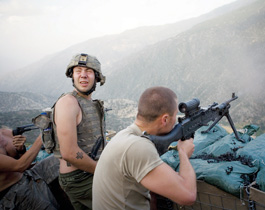home | metro santa cruz index | film review

Photograph by Tim Hetherington
STANDING DUCK: Specialist Misha Pemble-Belkin during a firefight at Outpost Restrepo during combat in Afghanistan's Korengal Valley.
Afghan Dogs
Unvarnished 'Restrepo' is almost a new kind of war film
By Richard von Busack
THE KORENGAL VALLEY in eastern Afghanistan is the site where reportedly some 70 percent of the ordnance we've shot off has detonated. CNN once called the area "the most dangerous place on earth." It's actually rather striking; wetter than the California Sierra where fictional movies about Afghanistan are made, it has pines and creeks. Nevertheless, a look at the action here might dissuade Hemingway in his contention that war in the mountains is more beautiful.
About 820 yards almost straight up from Korengal Outpost is Restrepo, named in honor of a dead soldier. National Geographic is distributing Restrepo, by the nerveless documentary makers Sebastian Junger and Tim Hetherington. The pair made 10 visits there over the course of a squadron of soldiers' 15-month deployment. Restrepo itself is more of a shack than a base. It's not much bigger than some people's motor homes. It's made mostly out of plywood and surrounded with sandbags that just slow bullets down rather than stop them completely. It's hand-dug and sewage facility-free. As in Vietnam, the soldiers burn their own dung mixed with diesel fuel in a 55-gallon oil drum.
Capt. Dan Kearney spends his hitch trying to improve the reputation of the American military. He tells a gathering of local elders that he isn't like his predecessors, that the soldiers weren't going to be dragging the locals off to Bagram whence they never return. The old Afghans, with their turbans and dyed beards, register this info for what it's worth; later, in the matter of a local cow first accidentally killed, then deliberately eaten, you have to share their doubt. The U.S. government can't even cough up a couple of hundred dollars in cow-indemnity. And the soldiers' most dangerous excursion into the terrain ends up with children as casualties, not counting the losses on our side.
The crystal-clear visuals make Restrepo almost a new kind of war film. Compact and understated, it's essential viewing about the Afghanistan conflict. In this documentary, soldiers say the same things they say in the movies ("I'm going to find the bastard and kill him"), but the tone is different, more casual. There's less playing to an audience.
The two filmmakers have the sense to realize that a previously identified soldier might need to be reidentified if you're seeing him with sunglasses and a helmet on. And they don't presume intimacy. They're excellent at fading into the woodwork, though, when the soldiers are celebrating their Christmas with a dance and a spool of colored lights.
Unlike the bruisers in a Hollywood or Indiewood war movie, the soldiers here look smaller than life. Ever when they're swaggering or talking trash, they're gentler. When they lose a comrade, they bawl unashamedly on the spot. They're human in a way that the soldiers in movies aren't. Seeing Restrepo, I lost the usual conviction that you never really know something about a war until the experience is digested over the course of years and someone writes a great novel about it. As in the upcoming Tillman Story, we get a sense of war and the warriors being far different than we imagined.
Restrepo's only conclusions about what we see come in the form of a piece of musical raucousness: a tune about a bloody, drunken but unbowed "Barroom Hero" in a song by the Dropkick Murphys. The gutter-Kipling lyrics of the song say something about the reasons why soldiers fight and how they survive.
However, it's not up to the soldiers whether they come or go, but up to the civilian government for which they fight. As citizens, it's our duty to talk about when this war will end, rather than being silenced into understandable awe by the kind of bravery we see here.
RESTREPO (R; 101 min.), a documentary by Tim Hetherington and Sebastian Junger, opens Friday at the Nickelodeon.
Send letters to the editor here.
|
|
|
|
|
|